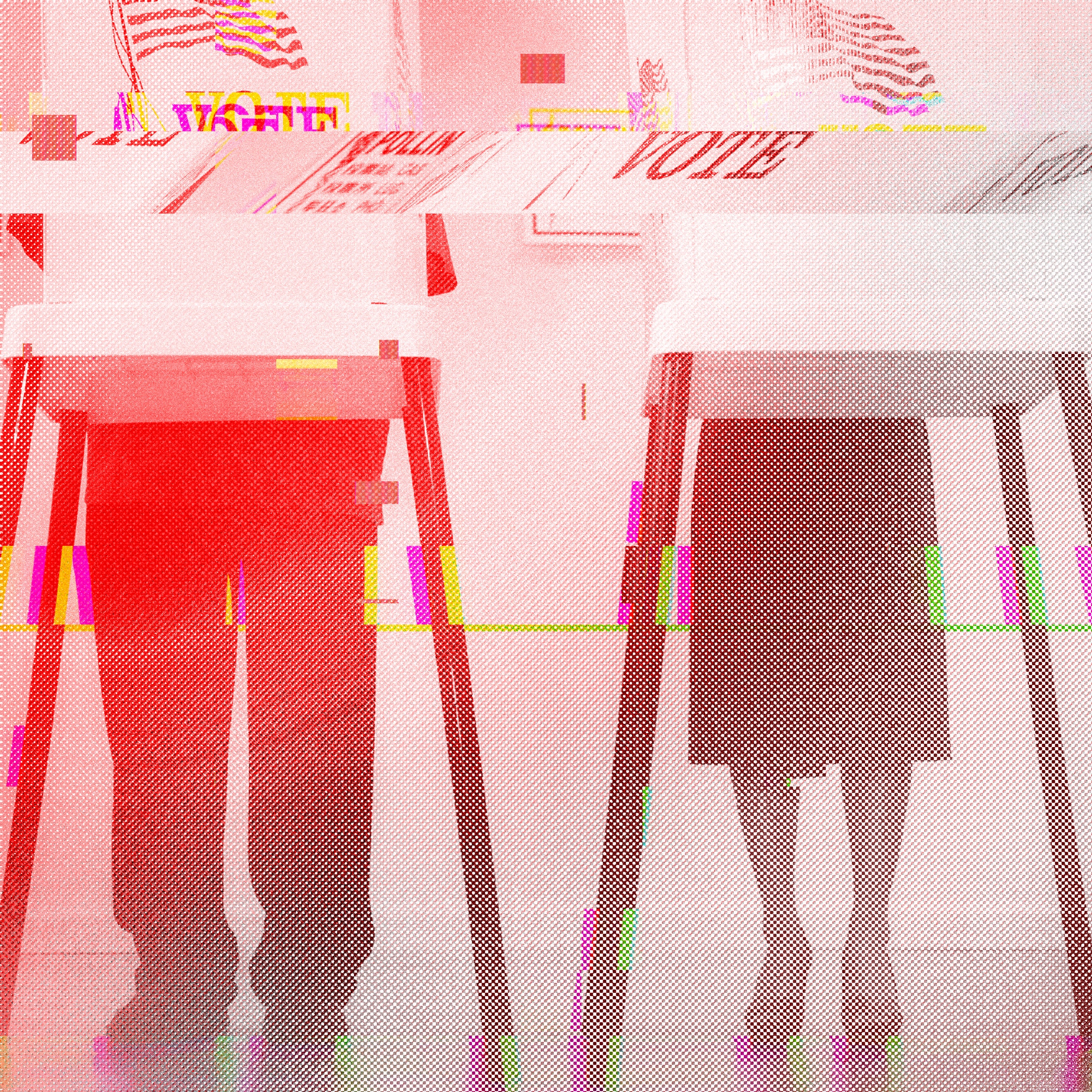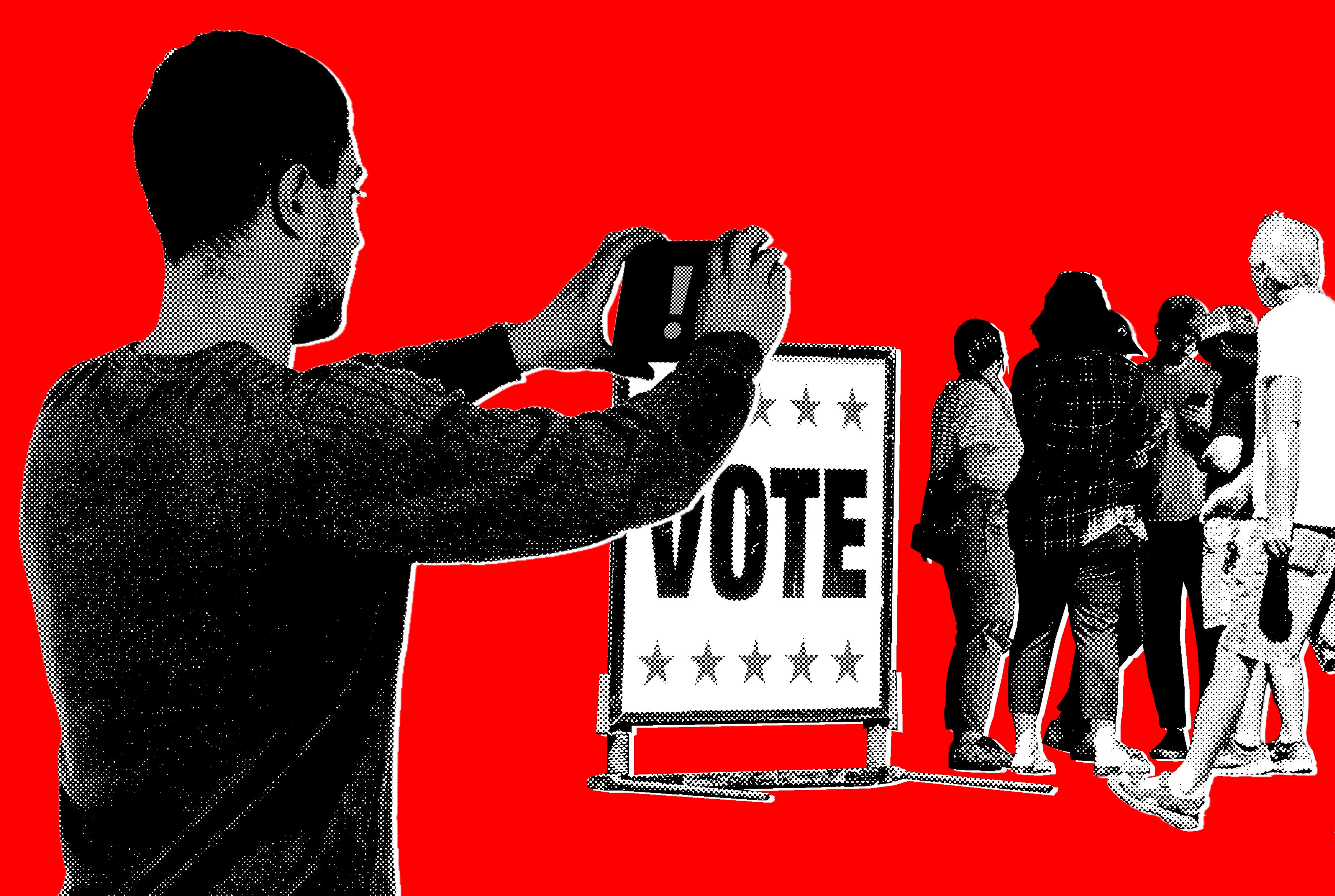
For the past six months, election denial groups across the United States have been laser-focused on efforts to purge voter rolls in support of former president Donald Trump’s reelection bid.
Using new apps and online tools, they claim their volunteers have filed hundreds of thousands of voter registration challenges. Though these efforts are based on unreliable data and debunked election fraud conspiracies, they threaten to disenfranchise voters by removing legitimate registrations. And as the deadline to file these voter roll challenges approaches next week, experts warn that these groups are already planning out their next moves to stop Democratic voters in swing states.
Catherine Engelbrecht, the founder of True the Vote, has argued for more than a decade that mismanaged voter rolls have led to widespread voter fraud. Recently, she wrote in her newsletter that True the Vote’s revamped IV3 tool, designed to automate the process of challenging voter registrations, was used by more than 35,000 volunteers. “To date, 6,937 citizens have completed 645,610 challenges across 1,322 counties,” she wrote. In a later interview on the right-wing War Room podcast, Engelbrecht said the number of challenges facilitated by IV3 was now more than 700,000.
The number of challenges made by True the Vote and other similar groups is expected to increase dramatically ahead of the upcoming deadline on August 7 that prohibits states from systematically removing voters within 90 days of a federal election.
But even before this deadline passes, these groups are already rolling out plans for the next phase of their efforts to disrupt the election. Groups across the US are recruiting tens of thousands of people to physically monitor polling stations, holding media training sessions, and launching an app designed to provide a real-time feed of alleged voting irregularities across the country.
True the Vote has been at the heart of the booming election denial movement that emerged in the wake of the 2020 election. The group rolled out IV3 initially in 2022, but a WIRED investigation at the time found the information used to challenge the registration of hundreds of thousands of people was based on unreliable data.
In April, the group rolled out a revamped version of the tool, which they have been promoting through online training sessions conducted by Engelbrecht. She claims that thousands of volunteers across the country have attended these training sessions. Still, many IV3 users have reported technical glitches with the product. “Even when they’re trained to generate the challenges, they are reaching sort of a bottleneck on actually submitting them,” says Emily Steiner, a researcher at Documented, a nonprofit that has tracked the activities of these groups.
Engelbrecht and True the Vote did not respond to a request for comment about their activities.
The use of new technology tools to supercharge these voter challenges is also being pushed by the Election Integrity Network (EIN), which is run by Cleta Mitchell, a former Trump adviser who was present on the January 2021 phone call when Trump asked Georgia’s secretary of state to “find” enough votes to flip Georgia in his favor.
EIN advises its network of state-level groups to conduct voter roll challenges using EagleAI, a tool designed to automatically create lists of ineligible voters. Activists in EIN’s network across the country take these lists and manually review them, and, at times, conduct door-to-door canvasses to back up their challenges—a practice that has been condemned for intimidating voters. Experts have also already pointed out flaws with EagleAI’s system: Tiny errors in name spellings, such as missing commas, can lead to names being removed from voter rolls incorrectly. The software is also reportedly facing numerous technical issues. Despite this, one county in Georgia has already signed a contract with the company to use the tool as part of its voter roll maintenance.
Leaked documents published this month by Documented and ProPublica show that one of the funders of EagleAI is Ziklag, a ultrasecretive group of wealthy individuals dedicated to pushing an overtly Christian nationalist agenda. According to an internal video obtained by ProPublica, Ziklag plans to invest $800,000 in “EagleAI’s clean the rolls project,” and one of the group’s goals is to “remove up to one million ineligible registrations and around 280,000 ineligible voters” in Arizona, Nevada, Georgia, and Wisconsin.
Mitchell and EIN are also working with a number of other groups that are supporting mass voter roll challenges. One of those is VoteRef, which has obtained and published voter rolls for more than 161 million voters in 31 states. The group is run by Gina Swoboda, a former Trump campaign official and current chair of the Republican Party in Arizona. State election officials have said that VoteRef’s claims of discrepancies in voter rolls are “fundamentally incorrect,” and highlighted significant privacy concerns about the data that VoteRef is making publicly available.
EIN is also working with Check My Vote, a website that hosts publicly available voter rolls and highlights what it calls irregularities, urging those using the system to create walk lists that activists can use to conduct door-to-door canvassing before filing voter challenges with a template available to download from the site.
Mitchell and EIN did not respond to a request for comment.
“These groups and the broader election denial movement have been building these structures, building these projects, over the course of many, many months and years, in preparation for this moment,” says Brendan Fischer, deputy executive director at Documented. “And the pieces are finally falling into place, where they can begin to file these mass challenges for voter eligibility.”
Voter rolls are notoriously difficult to maintain, given federal laws that prevent citizens from being removed years after they may have left the jurisdiction. But there is no evidence to back up the claims that this issue causes voter fraud. And election administrators tell WIRED that the processes in place to ensure voter rolls are as accurate as possible already work.
“[We are] aware of an increase in voter registration challenges over the past year, often submitted by a single individual or entity, on the basis that a voter may no longer be residing at the address of registration,” says Matt Heckel, press secretary for the Pennsylvania Department of State. “These challenges are an attempt to circumvent the list maintenance processes that are carefully prescribed by state and federal law.”
Heckel tells WIRED that regular maintenance of the voter roll in 2023 resulted in over 400,000 voter record cancellations in Pennsylvania alone.
“Challenges which seek to remove voters on the basis of unverified information or a timeline inconsistent with federal law will lead to disenfranchisement, unnecessary litigation, and a harassing diversion of already-stretched county resources,” says Heckel.
The extra workload created by these mass voter challenges, in addition to potentially disenfranchising voters, also means that overworked election officials are spending valuable time on processing these claims before the federal deadline of August 7.
“States have very specific requirements around what can be challenged and by whom, as well as the timeliness of election officials responding to the claim which may, or may not align with their state laws,” says Tammy Patrick, CEO of the National Association of Election Officials. “Over one-third of our local election offices do not have a full-time employee and any additional tasks can quickly become burdensome and overwhelm those who are responsible for conducting our elections.”
Election denial groups at national and local levels are now beginning to turn their focus to the next part of their plan to lay the foundations to undermine the 2024 vote. True the Vote and EIN are already seeking to sign up volunteers to monitor drop boxes and polling locations.
EIN also hosts media trainings, where the topics include identifying “media outlets that influence your target markets,” and how to “identify the gatekeepers—such as reporters, editors, and producers—at those outlets.” The group is also actively signing up people to become poll watchers for November’s vote, having worked in 2022 with the Republican National Committee to help them train an army of volunteers.
“From working with sheriffs to install and monitor dropboxes, to working with citizens to lawfully get eyes on, plans are underway to do all we can [to] minimize the kind of exploitation we saw at ballot dropboxes in 2020,” Engelbrecht wrote in a newsletter earlier this month. (It’s unclear exactly what sheriffs Engelbrecht is talking about. In the past the group has worked with the far-right Constitutional Sheriffs and Peace Officers Association, but that group’s founder, Richard Mack, told WIRED he was unaware of any plans True the Vote had in place.)
Another part of Engelbrecht’s plan is the rollout of a new app called VoteAlert designed to get on the ground activists to post any irregularities they see on the ground. “Our new app, VoteAlert, is being tested right now and readied for launch in the next few weeks,” Engelbrecht wrote in the same newsletter. “This app will support real time online reporting of election incidents and a bilingual toll free call line.”
Similar initiatives are occurring locally as well. Nevada’s Pig Pen Project, run by former executive directors of the Nevada GOP Dan Burdish and Chuck Muth, files voter roll challenges by using its own software as well as EagleAI. Now, they’re conducting door-to-door canvasses in collaboration with landlords in a bid to verify the lists of residents they believe are illegally registered on voter rolls. On its website, the group features multiple endorsements, including one from white supremacist Paul Nehlen.
Wisconsin’s North of 29 is another group that conducts door-to-door canvassing as part of its efforts to challenge voter registrations, taking affidavits from residents to back up their voter roll challenges before presenting this data to county clerks and sheriffs. The group was founded by Stephanie Forrer-Harbridge, who also leads the state chapter of Cause of America, the Mike Lindell–funded election integrity group. Cause of America has a history of taking part in these canvasses, and in 2022 the group’s leader, Shawn Smith, was sued in Colorado for conducting “door-to-door voter intimidation.” The lawsuit was dismissed earlier this month, after the judge found insufficient evidence of voter intimidation.
“We’re also hoping that some of the sheriffs will get on board and maybe get some prosecutions when there’s been fraudulent votes,” said Scott Harbridge, Stephanie Forrer-Harbridge’s husband who is running for Wisconsin State Assembly, in a recent interview on Rumble.
“Staffing poll observers, both during early voting and on election day, in addition to mass voter challenges, in addition to conducting citizen research about election conspiracy theories—these are all priorities for them,” says Fischer about election denial groups.
These goals have been in the works for years: The Trump-controlled Republican National Committee has already signaled its plans to recruit 100,000 volunteers to monitor the polls during the election. In 2022, the RNC leveraged Mitchell’s network to help it train poll workers in the lead-up to the midterms, and the group currently has a sign-up sheet on its website ahead of the 2024 vote.
In addition to the barriers to voting, experts worry about the impact these efforts will have on trust in the election process. And that lack of trust, Fischer says, also appears to be at least part of the point.
“In addition to overwhelming election clerks, creating hurdles for eligible voters to cast their ballots, these mass voter challenges also seem to be laying the groundwork for litigation that could result in people getting kicked off the voter rolls,” says Fischer. “But also, it sets the groundwork to challenge the legitimacy of the election results.”



